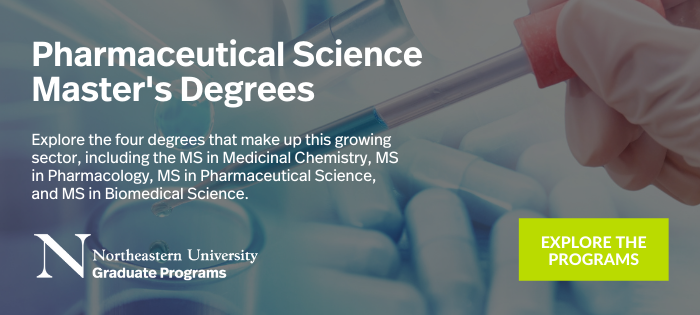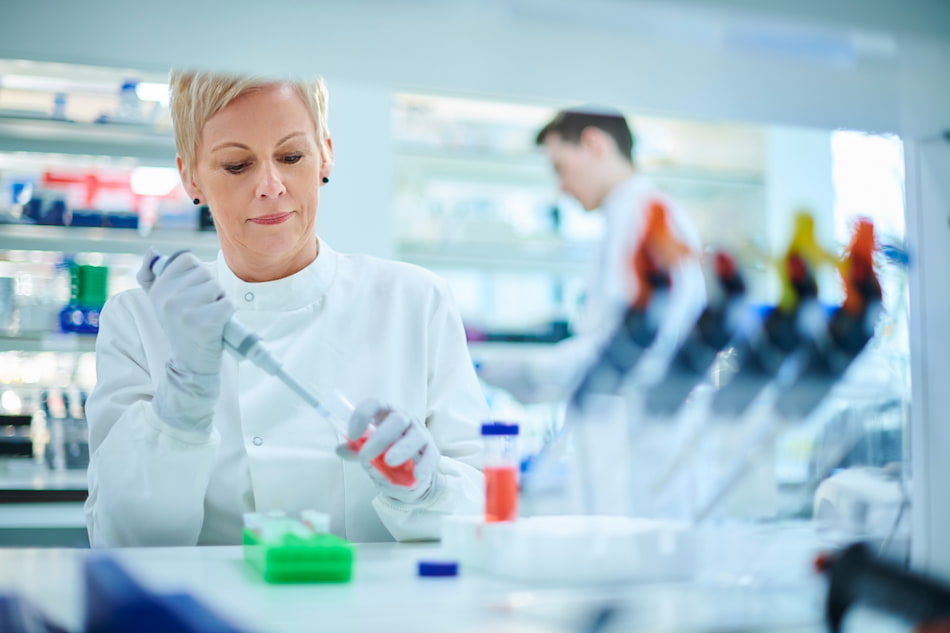According to David Janero, director of the pharmaceutical sciences graduate programs at Northeastern University, there has never been a more compelling time to become a part of the pharmacology industry.
“There are going to be increasing and evolving opportunities for pharmaceutical science graduates in the next few years,” he says, citing a few specific developments as the catalyst for this growth.
“The COVID-19 situation has really put a spotlight on the ability of the pharmaceutical and biotechnology industries to do good and to address the global pandemic,” he offers as an example. He explains that this positive attention—and the speed at which these pharmaceutical science organizations have addressed the worldwide health crisis—have led to increased career opportunities for professionals.
Another recent development impacting this growth is the ongoing shifts in the field. Scientists have expanded their scope beyond the creation of conventional drugs to now include the study and development of vaccines, cell- and protein-based therapies, and even gene-engineering and gene-therapeutics.
This shift, along with technological advancements and the overall lengthening lifespan of the average person, have resulted in an unprecedented need for pharmaceutical scientists with the skills and experiences necessary to make an impact.
Professionals looking to become a part of this industry at such a defining moment in history should consider pursuing a master’s in pharmacology. This degree is designed to provide the training and real-world experiences needed to not only land a role in this growing field, but to excel in it.
Below, we examine the most common paths for master’s in pharmacology graduates and explore how an advanced pharmacology degree provides the training professionals need to succeed.
Advance Your Career with a Master’s in Pharmaceutical Science
Learn how to transform your career in an industry that’s transforming the world.
Careers for Master’s in Pharmacology Graduates
Northeastern’s master’s in pharmacology program is designed to provide a holistic exploration of the field while offering the chance to specialize in areas that align with your unique career goals. As a result, there are dozens of applicable professional paths for those who graduate from this kind of program.
“I think it’s a good thing that our students are informed about the wide array of career options available to them,” Janero says. “It incentivizes them to look beyond the obvious and find a career that fits their personal interests.”
For example, many graduates go on to pursue research in a wet lab. These graduates’ roles might include doing bench work developing drugs or external medical products within a biotechnology or pharmaceutical company or a university research team.
Other professionals may choose to instead “take knowledge they learn in their master’s program and apply it away from the bench,” Janero explains.
Though this is a perhaps less conventional application of their training, many graduates of Northeastern’s program specifically have created incredibly successful careers by pursuing niche applications of the industry.
Below we explore some of the research-based and alternative career options that those with a master’s degree in pharmacology can pursue.
Keep in Mind: Many of the titles outlined below offer extraordinary opportunities for advancement as well as competitive salaries. One factor that often contributes to a higher salary among these roles is the location of employment. Boston and Cambridge, for example, are known worldwide as hubs for the biotech and pharmaceutical sciences industries. For that reason, salaries at companies in these areas can often far surpass that of the national averages.
1. Medical Writer
Professional medical writers can work either closely with physicians on developing research papers and articles about their work, or with a pharmaceutical or biotech company on the creation of educational and sales materials. These materials often outline how a new product works, including the benefits, side effects, and more. Medical writers may also be tasked with handling administrative writing tasks as they relate to pharmaceutical products, such as license renewals, contracts, etc.
Medical writers earn an average salary of $72,612 per year; however, those working in high-demand locations can earn up to $90,000 annually.
2. Pharmaceutical Sales Representative
These professionals often work directly with biotech and pharmaceutical companies. They engage both existing and potential clients, pitch the products developed within their organization, and close deals between the two groups. This work can sometimes include aspects of people and project management, customer service, and marketing.
The average annual salary for pharmaceutical sales representatives is $85,308, with those on the high end of this role making over $120,000 per year.
3. Pharmaceutical Lab Scientist
Pharmaceutical lab scientists are in charge of the actual research and development process of new drugs, products, and therapies. They can work in either the public sector for a university or the private sector for a pharmaceutical or biotech company. Their main responsibilities include conducting research, drug development and discovery, testing, performing clinical trials, and more.
Salaries for professionals in this role can vary depending on a variety of factors. However, average salaries range from $80,635 to $103,819 per year.
Learn More: How to Become a Pharmaceutical Scientist
4. Pharmaceutical Marketing Manager
A pharmaceutical marketing manager is in charge of developing the branding for newly developed products and maintaining the established marketing tactics and approach for existing products. These professionals often work in tandem with the sales representatives, as they share the similar goal of ensuring the materials are well-received by both physicians and the public.
The average salary for pharmaceutical marketing managers is $108,856 per year.
5. Medical Liaison
Medical liaisons act as the primary source of contact between big pharmaceutical companies and physicians. This is an important role because, alongside representing and understanding the pharmaceutical company’s perspective, “medical liaisons can explain, in molecular terms, how drugs work and can benefit the patient,” Janero says—a skill which is of great benefit to the physician.
The average salary for a medical liaison is $136,673 per year, with those on the high end of this role making upwards of $170,000 annually.
Continuing Your Education with a Doctorate-Level Degree
While many who graduate with a master’s in pharmacology go on to pursue one of these career paths, others may choose to build off their advanced training and parlay it into a doctorate-level degree.
There are many reasons a graduate might consider this path. For instance, some high-level roles in the medical field require a specific cumulative degree. A Doctor of Pharmacy, for example, allows an individual to become licensed to dispense drugs, making it a common next step for those with a master’s in pharmacology.
Another common option among these graduates is a PhD in pharmacology itself. Janero explains that the pursuit of this degree “would open doors to independent research…as well as higher-level management roles in pharmacology and drug discovery.”
Did You Know: There are many benefits to pursuing a master’s in pharmacology at Northeastern and then advancing into a PhD program at the university. “If you have a master’s degree from Northeastern, you don’t have to retake any of the courses,” Janero says. “So you come in essentially with advanced standing into the PhD program.” This is an especially significant draw to those hoping to reduce the amount of time spent in school before embarking on their professional career.
While, for many, the opportunities available to them with a PhD are worth the additional time spent in school, other professionals may prefer to dive directly into the field after obtaining their master’s degree. “It’s about looking at the return on investment for your career and what matters to you,” Janero says.
Pursuing a Master’s in Pharmacology at Northeastern
At Northeastern, the master’s in pharmacology program is designed to expand upon any knowledge obtained at the undergraduate level, and develop students into professionals ready to tackle the unique challenges of the industry.
“The real difference between an undergraduate and graduate education in pharmacology is that, in an undergraduate program, you’re being asked to answer questions,” Janero says. “At an advanced level of education, you get that depth of understanding that allows you to probe, ask your own questions, and hopefully uncover answers that will help to push the field forward.”
At Northeastern, this is accomplished through “deeper and more specialized learning in the field of drug action and new drug invention,” as well as a “more in-depth and current exploration into current research that’s ongoing,” Janero says.
What’s more, Northeastern is known for creating opportunities that allow students to explore their skills acquired in the classroom in the real-world prior to graduation through experiential learning.
“We have an active, focused co-op and experiential learning program,” Janero says. “Many Boston area pharma and biotech companies—including both early-stage companies as well as very established pharmaceutical and biotech companies—take our master’s students into their organizations as part of these programs.”
Real-world opportunities for Northeastern’s master’s students aren’t limited to those that happen off-campus, however. Northeastern also offers world-class laboratories and facilities that allow master’s students to join ongoing research projects led by faculty and other experts.
This format allows students to gain hands-on experience, build their resumés, and even begin to develop their professional networks, all before they graduate. Additionally, studying in Boston—a city known globally for its advances in the fields of pharmacology and biotechnology—gives graduates an added leg-up over the competition when it comes to landing roles both during their master’s program and beyond.
“These opportunities differentiate Northeastern from other universities and are often very attractive to aspiring master’s students,” Janero says.
Taking the Next Step
Are you considering a master’s in pharmacology from Northeastern? Explore the program requirements, curriculum, faculty, and much more on the official Master’s of Science in Pharmacology program page. For those seeking personalized advice, Northeastern also has a team of enrollment coaches on standby, ready to answer your questions and guide you to the program that best fits your unique career goals.







Related Articles
PhD vs. Master’s in Biomedical Science: What’s the Difference?
10 Top Careers in Biomedical Science
What is Medicinal Chemistry?